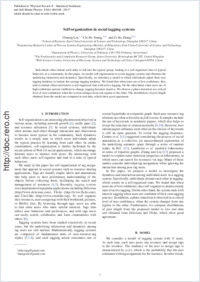Self-organization in social tagging systems
- Liu, Chuang School of Business, East China University of Science and Technology, Shanghai, China - Engineering Research Center of Process Systems Engineering (Ministry of Education), East China University of Science and Technology, Shanghai, China
- Yeung, Chi Ho Department of Physics, University of Fribourg, Switzerland - The Nonlinearity and Complexity Research Group, Aston University, Birmingham, United Kingdom
- Zhang, Zi-Ke Department of Physics, University of Fribourg, Switzerland - Web Sciences Center, University of Electronic Science and Technology of China, Chengdu, China
-
09.06.2011
Published in:
- Physical Review E - Statistical Nonlinear, and Soft Matter Physics. - 2011, vol. 83, no. 6, p. 06604
English
Individuals often imitate each other to fall into the typical group, leading to a self-organized state of typical behaviors in a community. In this paper, we model self-organization in social tagging systems and illustrate the underlying interaction and dynamics. Specifically, we introduce a model in which individuals adjust their own tagging tendency to imitate the average tagging tendency. We found that when users are of low confidence, they tend to imitate others and lead to a self-organized state with active tagging. On the other hand, when users are of high confidence and are stubborn to change, tagging becomes inactive. We observe a phase transition at a critical level of user confidence when the system changes from one regime to the other. The distributions of post length obtained from the model are compared to real data, which show good agreement.
- Faculty
- Faculté des sciences et de médecine
- Department
- Département de Physique
- Language
-
- English
- Classification
- Physics
- License
-
License undefined
- Identifiers
-
- RERO DOC 27275
- DOI 10.1103/PhysRevE.83.066104
- Persistent URL
- https://folia.unifr.ch/unifr/documents/302098
Statistics
Document views: 109
File downloads:
- pdf: 169
